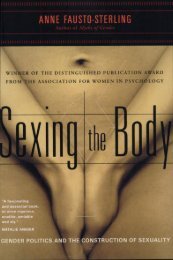C. Wiebes - Intelligence en de oorlog in Bosnië 1992-1995. De rol van de inlichtingen- en veiligheidsdiensten - Engels
C. Wiebes - Intelligence en de oorlog in Bosnië 1992-1995. De rol van de inlichtingen- en veiligheidsdiensten - Engels
C. Wiebes - Intelligence en de oorlog in Bosnië 1992-1995. De rol van de inlichtingen- en veiligheidsdiensten - Engels
- No tags were found...
Create successful ePaper yourself
Turn your PDF publications into a flip-book with our unique Google optimized e-Paper software.
23un<strong>de</strong>rm<strong>in</strong>ed the i<strong>de</strong>a that the <strong>in</strong>tellig<strong>en</strong>ce was first and foremost for the UN. 66 The Americangovernm<strong>en</strong>t also supplied and cont<strong>in</strong>ues to supply satellite photographs to the International AtomicEnergy Authority (IAEA) <strong>in</strong> Vi<strong>en</strong>na, which ‘monitors’ the nuclear programs of Iraq and North Korea. 67However, as Tim Crawford po<strong>in</strong>ts out, there were various th<strong>in</strong>gs count<strong>in</strong>g aga<strong>in</strong>st the IAEA asregards shar<strong>in</strong>g <strong>in</strong>tellig<strong>en</strong>ce with this body. One of them was that IAEA officials, steeped <strong>in</strong> the UNculture of transpar<strong>en</strong>cy, simply did not have the “m<strong>in</strong>dset” to properly handle and use s<strong>en</strong>sitive<strong>in</strong>formation. For example, on one occasion, a s<strong>en</strong>ior IAEA <strong>in</strong>spector was reported to have casuallyshowed s<strong>en</strong>sitive over-head imagery to an official not <strong>in</strong>volved <strong>in</strong> <strong>in</strong>spections. On another occasion,that same <strong>in</strong>spector left overhead imagery out on his <strong>de</strong>sk dur<strong>in</strong>g a meet<strong>in</strong>g with Iraqi officials. 68To summarize, it can be stated that, dur<strong>in</strong>g peacekeep<strong>in</strong>g operations <strong>in</strong> a UN context,<strong>in</strong><strong>de</strong>p<strong>en</strong>d<strong>en</strong>t <strong>in</strong>tellig<strong>en</strong>ce gather<strong>in</strong>g was sometimes carried out, with the 1960 Congo experi<strong>en</strong>ce be<strong>in</strong>g ahighlight, but <strong>in</strong> g<strong>en</strong>eral the UN rema<strong>in</strong>ed completely <strong>de</strong>p<strong>en</strong>d<strong>en</strong>t on what a member state (mostly theUnited States) was prepared to supply. The exception was UNSCOM, which received <strong>in</strong>tellig<strong>en</strong>cesupport from a wi<strong>de</strong> array of governm<strong>en</strong>ts. But this tells us more about the real character of UNSCOMthan about <strong>in</strong>tellig<strong>en</strong>ce shar<strong>in</strong>g with the UN <strong>in</strong> g<strong>en</strong>eral. 696. <strong>Intellig<strong>en</strong>ce</strong> with<strong>in</strong> the exist<strong>in</strong>g UN cultureS<strong>in</strong>ce the ext<strong>en</strong>sive military <strong>en</strong>terprise <strong>in</strong> Congo, much has changed concern<strong>in</strong>g peacekeep<strong>in</strong>goperations <strong>in</strong> a UN context. Until <strong>1992</strong>, the mission <strong>in</strong> Congo with 20,000 peacekeepers was the largestmilitary operation so far, but that record was brok<strong>en</strong> <strong>in</strong> the same year: UNPROFOR had more than40,000 personnel, plus the support of a substantial air force from NATO and a fleet from the WEU. Itis also significant that the mandate of most peacekeep<strong>in</strong>g operations nowadays is much broa<strong>de</strong>r thanused to be the case. For <strong>in</strong>stance, missions are now charged with supervis<strong>in</strong>g compliance withsanctions, protect<strong>in</strong>g Safe Areas, provid<strong>in</strong>g humanitarian relief, support<strong>in</strong>g Displaced Persons,monitor<strong>in</strong>g local elections, or assist<strong>in</strong>g <strong>in</strong> the <strong>de</strong>velopm<strong>en</strong>t of the <strong>in</strong>frastructure. 70 However, thisexpansion of tasks triggered neither a new attitu<strong>de</strong> to <strong>in</strong>tellig<strong>en</strong>ce with<strong>in</strong> the UN, nor any significantchange of organizational culture.The th<strong>en</strong> Secretary-G<strong>en</strong>eral of the UN, Javier Pérez <strong>de</strong> Cuéllar, had tried <strong>in</strong> the late 1980s toimprove the flow of <strong>in</strong>tellig<strong>en</strong>ce to UN Headquarters but this ran <strong>in</strong>to immediate trouble. He th<strong>en</strong>created an Office for Research and the Collection of Information (ORCI) <strong>in</strong> the Secretariat. He taskedORCI with collect<strong>in</strong>g, organiz<strong>in</strong>g, and analyz<strong>in</strong>g political <strong>in</strong>formation received from all available sourcesto support his activities and to advise him of threat<strong>en</strong><strong>in</strong>g <strong>de</strong>velopm<strong>en</strong>ts. ORCI also did not last.Accord<strong>in</strong>g to a UN veteran who served on Cuellar’s executive staff, ORCI was stymied, not only by‘<strong>in</strong>suffici<strong>en</strong>t managerial skill’ but also by ‘bureaucratic resistance from other Secretariat <strong>de</strong>partm<strong>en</strong>tsthat were fearful of <strong>en</strong>croachm<strong>en</strong>t on their territory’. ORCI was disban<strong>de</strong>d <strong>in</strong> March <strong>1992</strong> by the newSecretary G<strong>en</strong>eral, Boutros Boutros Gali and its functions were parceled out to other parts of the UN.Like Crawford correctly observed: a c<strong>en</strong>tral organ for handl<strong>in</strong>g and analyz<strong>in</strong>g s<strong>en</strong>sitive <strong>in</strong>formation,66 A. Walter Dorn, ‘The Cloak and the Blue Beret: Limitations on <strong>Intellig<strong>en</strong>ce</strong> <strong>in</strong> UN Peacekeep<strong>in</strong>g’, International Journal of<strong>Intellig<strong>en</strong>ce</strong> and Counter<strong>in</strong>tellig<strong>en</strong>ce, Vol. 12 (1998) 4, pp. 439-440.67 Robert J. All<strong>en</strong>, ‘<strong>Intellig<strong>en</strong>ce</strong> Support for Peace Operations’, Pickert, <strong>Intellig<strong>en</strong>ce</strong>, p. 117 and Richelson, The U.S. <strong>Intellig<strong>en</strong>ce</strong>Community, pp. 293-294.68 Timothy W. Crawford, ‘Why Ever Not Never? <strong>Intellig<strong>en</strong>ce</strong> Cooperation <strong>in</strong> United Nations Security Affairs’, Paper preparedfor the Annual Confer<strong>en</strong>ce of the Canadian Association for Security and <strong>Intellig<strong>en</strong>ce</strong> Studies, Ottawa, 28/09/02, p. 19.69 See for the recurr<strong>en</strong>t problems as regards US <strong>in</strong>tellig<strong>en</strong>ce support for the UN weapon <strong>in</strong>spections <strong>in</strong> Iraq: Colum Lynch,‘U.N. Arms Inspector Seeks U.S. <strong>Intellig<strong>en</strong>ce</strong>’, The Wash<strong>in</strong>gton Post, 10/10/02; Julia Preston, ‘Weapons Inspector Ask U.S. toShare Secret Iraq Data’, The New York Times, 07/12/02; David E. Sanger and Julia Preston, ‘U.S. is to release spy data onIraq to aid <strong>in</strong>spectors’, The New York Times, 20/12/02 Pieter Spiegel, ‘P<strong>en</strong>tagon offers drone <strong>in</strong> hunt for weapons’, F<strong>in</strong>ancialTimes, 16/01/03.70 A. Walter Dorn, ‘The Cloak and the Blue Beret: Limitations on <strong>Intellig<strong>en</strong>ce</strong> <strong>in</strong> UN Peacekeep<strong>in</strong>g’, International Journal of<strong>Intellig<strong>en</strong>ce</strong> and Counter<strong>in</strong>tellig<strong>en</strong>ce, Vol. 12 (1998) 4, pp. 414-427.





